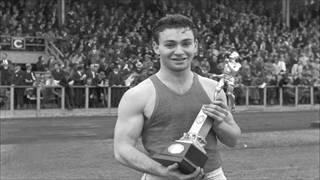
Marty Glickman, a son of the Bronx who was often referred to in his youth as the Jewish kid who could run faster than anyone in the neighborhood, is the subject of a documentary which premiers tonight on HBO.
From the streets of the Bronx, to being pulled from competing in the 1936 Berlin Olympics in Nazi Germany, Glickman eventually became a famed sportscaster.
Read the full story from Reuters:
Film shows dashed dream, triumph of athlete-sportscaster Glickman
Mon Aug 26, 2013 12:55am IST
By Chris Michaud
NEW YORK, Aug 25 (Reuters) – Barred from competing in the 1936 Olympics, the Jewish kid from the Bronx who could run faster than anyone in the neighborhood went on to forge a career as a pioneering sportscaster who was the voice of two pro franchises, but never forgot his roots.”
I don’t ever remember walking as a young person,” Marty Glickman, the subject of the documentary “Glickman” which premieres on Monday on HBO, says in the film’s opening.”
I always ran. It was my nature to run.”But at the 1936 Olympics in Berlin, then under the grip of Adolf Hitler’s Nazis, Glickman was one of two Jewish runners on the U.S. relay team pulled by U.S. officials at the 11th hour.
Glickman, who died in 2001 at 83 and was known as the voice of the NBA’s New York Knicks, the NFL’s New York Giants as well as Paramount Newsreels, recalled being frustrated and angry.”
I wanted to show that a Jew could do just as well as any other individual, and perhaps even better,” he said in the film.
“He never really became a national broadcaster, which bothered him,” said the film’s director, James Freedman, who worked at age 17 for Glickman producing the broadcaster’s late-night WNEW radio show, and was treated “not as a high school kid, but as a producer.
“Freedman, a successful television writer for hit TV shows such as “Cybill,” recalled that “people in Hollywood would say ‘Who’s Marty Glickman?’ So I hope this film will bring him the national recognition that he so deserved,” he told Reuters.”
He was the first jock-turned-broadcaster in the history of the medium.”
“Glickman,” which had Martin Scorsese as executive producer, features interviews with leading sports figures such as Bob Costas and Marv Albert, both of whom he mentored, Larry King, Red Auerbach and Frank Gifford. It intercuts those with archival footage of his youthful athletic feats in track and football and his legendary broadcasts.
“There was an almost orchestral quality to his vocal inflection … a texture to it that only a tiny handful of broadcasters could ever match,” Costas says in the film.Said King: “He invented the one best term ever in sports broadcasting – swish,” used to describe the ball passing quickly and without resistance down through a basketball net.
“Nobody framed a basketball game like Marty Glickman,” King added. “I saw the game.”
Scorsese reflected that “You don’t need to know about Marty Glickman to appreciate the film. I am certainly not a sports enthusiast.” But the Oscar-winning director was intrigued by Glickman’s “intense commitment, one that fought through adversity and bigotry. There was no other option for him besides the games.”
Freedman said that despite having known and worked with Glickman since his youth, he learned more about the man through making the film.
“I had no idea how great an athlete he was,” said the first-time director. “He was once the third-fastest man in the world,” one of the two faster being the legendary Jesse Owens, another member of that 1936 U.S. Olympic team which struck down the Nazi myth of Aryan supremacy as Hitler watched.
“Also, I never knew just how deeply ’36 hurt him,” Freedman said, adding that he was deeply moved by “what happens when an 18-year-old kid’s dreams are crushed by prejudice.”
For his part, Glickman said it was not until he returned to Berlin’s Olympic stadium in 1985 that he became dizzy with rage, saying “I had maintained this pent up anger and hatred for 49 years.”
Glickman said he was asked about that dark time every four years during the Olympics. “I do not at all hesitate to tell the story, so that it won’t ever happen again,” he said.With the film, the story will win an even wider audience.(Editing by Vicki Allen)





